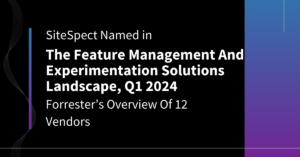Six Questions To Ask When Evaluating Your Optimization Strategy
By Bill Cunningham
September 5, 2018
Share
Selecting an optimization vendor is no easy task. Do you choose server side or client side? Should you focus on your web pages or mobile site? Can you even A/B test on an SPA? My competition like to take advantage of misunderstandings, assumptions, and knowledge gaps to push technology that either doesn’t meet the need or flat out doesn’t do what they say it does. The way we see things here at SiteSpect, we can’t succeed unless our customers are succeeding. Your customers interact with you across media and online channels, and that experience has to be cohesive in order to get the returns you want. So, when you’re choosing an optimization solution there are six questions we recommend you ask yourself and your vendors.

Can You A/B Test Your Entire Site?
This one may seem like a no-brainer, but you’d be surprised. It’s crucial that you can optimize everything from your check out process to your welcome page, from your back end function to the color of your navigation bar. You should also be able to A/B test any other third-party software — for example to make sure your product recommendations engine delivers conversions, or your search algorithm gives customers what they want. Further, are you A/B testing every representation of your website? What works on a desktop doesn’t always work on a cell phone or a tablet. The returns that I see on brands A/B testing unexpected factors can blow you away to the tune of millions of dollars. Don’t lose that revenue if you can help it, and don’t be pushed into buying three optimization products when you should be able integrate with one.
How Many Campaigns Can You Run?
If the answer is anything other than unlimited, run. Most of the time I find that once a brand starts with A/B testing and optimization, one A/B test just naturally leads to another. If you have to halt your whole process because your tool can’t keep up with your marketing and optimization team, you’re losing out. Having an optimized product detail page with a lackluster cart on an ecommerce site means abandoned items and fewer conversions. Don’t let that happen.
Will You Get the Support You Need?
Implementing an optimization software is a big step for any company, and you have to be careful that you use it to its potential. Find out what the training and implementation process is like, including how long it takes and what happens if anything goes wrong. Make sure you can access consultations, troubleshooting support, and help with building campaigns. Find out who is going to be on the other end of the phone if you call. Those services shouldn’t cost extra either — part of an optimization solution is implementing the optimization solution. If there’s an additional price next to customer service, then you’re not getting the value out of the product.
How Will A/B Testing Affect Site Speed?
This is a critical issue for any site. Site speed has been shown to influence conversion rates, and Google uses site speed as a factor in SEO ranking. Make sure that your solution does not insert additional JavaScript code in order to serve variation pages. Instead, a proxy solution (like SiteSpect) sits in the flow of traffic, which requires no lag time and often actually speeds websites up. Don’t settle for poor performance.
Will My Site Be Security Compliant Across the Board?
This has always been important, but especially with the recent adoption of the GDPR and the flurry of news around irresponsible data usage. Find out if your tool has been third-party audited and verified for compliance, your IT team will thank you. The points you should check for are: PCI compliance, GDPR compliance, HIPAA ready, Two factor authentication, Privacy Shield compliant, Single Sign On, and IP White List / Black List.
Can You Verify the Quality of the Data?
Your optimization efforts are only as good as the data they return. You’ll be making big decisions based on insights from user behavior and analytics tools. Any optimization tool that uses JavaScript tags though introduces data misfires — including inaccurate bot filtering — meaning your data becomes less reliable and your decisions less certain. Find out how your A/B testing solution deals with that. Only a proxy solution — SiteSpect is the only one — sits in the flow of traffic and sees every action at the client end and filters bots seamlessly.
So, when you’re shopping for an A/B testing solution, make sure you really dig in and know what you’re getting. SiteSpect guarantees to deliver on each of these questions, and you really should never settle for less than that.
To learn more about SiteSpect, visit our website.
Share
Suggested Posts
Subscribe to our blog:





